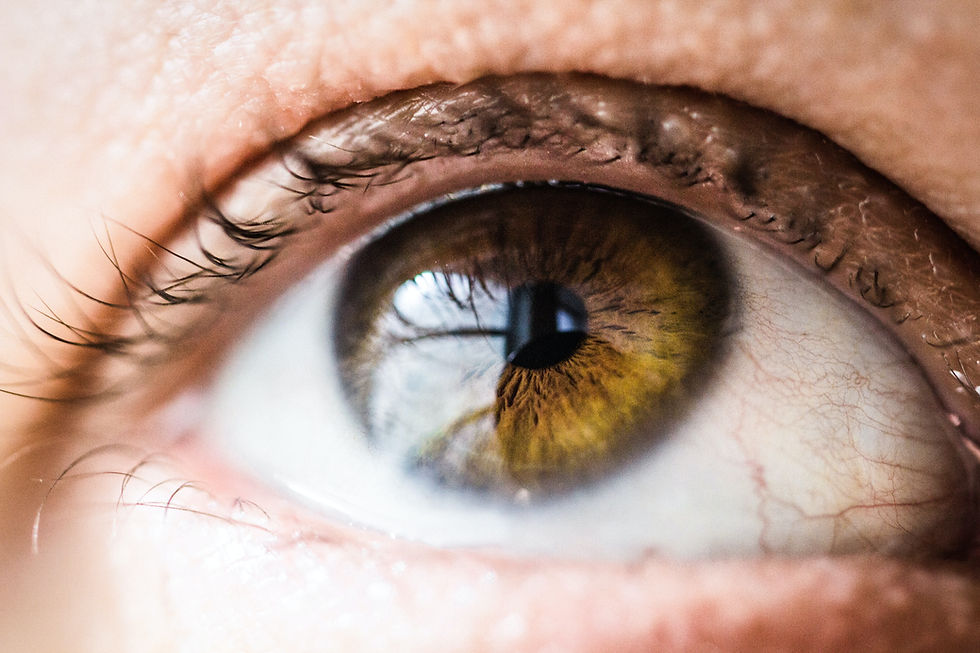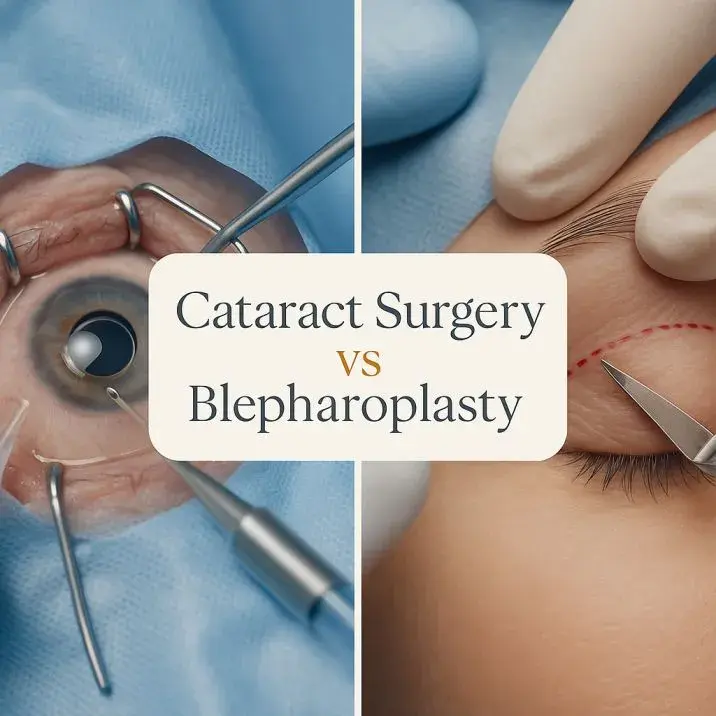Breaking Through the Fog: How Cataract Surgery Can Restore Your Vision
- Eyes Defined

- Jan 5, 2024
- 6 min read
Are you tired of living with blurry vision that hampers your daily activities and enjoyment of life? If so, cataract surgery may be the solution you've been searching for. This transformative procedure can help restore your vision and improve your quality of life.
Cataracts are a common age-related condition that causes clouding of the eye's natural lens. As a result, your vision becomes hazy, colors appear faded, and you may experience difficulties with night vision or glare from bright lights. While cataracts can be a frustrating and debilitating condition, the good news is that cataract surgery is a highly effective and safe solution.
During cataract surgery, the clouded lens is removed and replaced with an artificial lens called an intraocular lens (IOL). This IOL is custom-selected to address your specific vision needs, which means you can achieve clear vision at both near and distant.
Don't let cataracts hold you back from enjoying life to the fullest. Consult with an experienced ophthalmologist to determine if cataract surgery is the right option for you. Regain your clarity of vision and break through the fog with this life-changing procedure.

Understanding cataracts and their impact on vision
Cataracts are a common age-related condition that causes clouding of the eye's natural lens. The lens, which is normally clear, becomes cloudy over time, leading to vision problems. As a result, your vision becomes hazy, colors appear faded, and you may experience difficulties with night vision or glare from bright lights.
Cataracts can significantly impact your quality of life. Simple tasks like reading, driving, or recognizing faces become challenging. If left untreated, cataracts can even lead to blindness. However, the good news is that cataract surgery is a highly effective and safe solution.
The importance of cataract surgery
Cataract surgery is a life-changing procedure that can restore your vision and improve your overall quality of life. The surgery involves removing the clouded lens and replacing it with an artificial lens called an intraocular lens (IOL). This IOL is custom-selected to address your specific vision needs, which means you can achieve clear vision at both near and distant.
The decision to undergo cataract surgery is not one to be taken lightly. It is important to understand the impact cataracts have on your vision and how surgery can help restore it. By discussing your concerns and expectations with an experienced ophthalmologist, you can make an informed decision about whether cataract surgery is the right option for you.
Common signs and symptoms of cataracts
Recognizing the signs and symptoms of cataracts is crucial in determining whether you may need cataract surgery. Some common signs of cataracts include:
1. Blurred or hazy vision: Your vision may become increasingly blurry, making it difficult to read or perform daily tasks.
2. Sensitivity to light: Bright lights may cause discomfort or glare, making it challenging to drive at night.
3. Faded colors: Colors may appear dull or faded, making it difficult to appreciate vibrant hues.
4. Poor night vision: Cataracts can make it harder to see in low-light conditions, such as when driving at night.
If you experience any of these symptoms, it is important to consult with an ophthalmologist for a thorough evaluation and discussion of treatment options.
Preparing for cataract surgery
Preparing for cataract surgery involves several steps to ensure a successful procedure and a smooth recovery. Your ophthalmologist will guide you through the process, but here are some general steps to expect:
1. Consultation and evaluation: Your ophthalmologist will perform a comprehensive eye exam to assess the severity of your cataracts and determine if surgery is necessary. They will also measure your eyes to determine the appropriate IOL power for your vision correction.
2. Pre-operative instructions: Your ophthalmologist will provide specific instructions on how to prepare for surgery. This may include stopping certain medications, fasting before the procedure, and arranging for transportation on the day of surgery.
3. Anesthesia options: Cataract surgery is typically performed under local anesthesia, which numbs the eye. However, your ophthalmologist may discuss other anesthesia options based on your individual needs and preferences.
By following your ophthalmologist's instructions and preparing adequately, you can ensure a successful cataract surgery experience.

The different types of cataract surgery procedures
There are several different types of cataract surgery procedures, each with its own advantages and considerations. The most common types include:
1. Phacoemulsification: This is the most commonly performed cataract surgery procedure. It involves making a small incision in the cornea and using ultrasound technology to break up and remove the clouded lens. The IOL is then inserted through the same incision.
2. Extracapsular cataract extraction (ECCE): This procedure is used for more advanced cataracts where the lens is too dense to be broken up with ultrasound. A larger incision is made to remove the lens in one piece, and the IOL is inserted through this incision.
3. Laser-assisted cataract surgery: This advanced technique utilizes laser technology to perform certain steps of the surgery, such as creating incisions and breaking up the lens. Laser-assisted cataract surgery offers increased precision and potentially faster recovery times.
Your ophthalmologist will recommend the most suitable procedure for your specific needs based on the severity of your cataracts and other factors.
Recovery and post-operative care after cataract surgery
After cataract surgery, it is important to follow your ophthalmologist's post-operative care instructions to ensure a smooth recovery. Here are some general guidelines:
1. Use prescribed eye drops: Your ophthalmologist will prescribe eye drops to prevent infection and promote healing. It is crucial to use these drops as directed and avoid touching or rubbing your eyes.
2. Protect your eyes: Wearing a protective shield or glasses can help prevent accidental injury or rubbing of the eyes during the initial healing period.
3. Avoid strenuous activities: While you may be eager to resume your normal activities, it is important to avoid strenuous activities, such as heavy lifting or vigorous exercise, as these can strain your eyes during the healing process.
4. Attend follow-up appointments: Regular follow-up appointments with your ophthalmologist are essential to monitor your healing progress and address any concerns or complications that may arise.
By following these post-operative care instructions, you can optimize your recovery and ensure the best possible outcome after cataract surgery.
Potential risks and complications of cataract surgery
Like any surgical procedure, cataract surgery carries some risks and potential complications. However, the overall success rate of cataract surgery is high, and serious complications are rare. Some potential risks include:
1. Infection: While rare, there is a small risk of infection after cataract surgery. This risk can be minimized by using prescribed eye drops and following proper hygiene practices.
2. Inflammation: Inflammation in the eye can occur after cataract surgery, but it can usually be managed with prescribed eye drops and medications.
3. Retinal detachment: Although rare, retinal detachment is a serious complication that may require additional surgery. Regular follow-up appointments with your ophthalmologist can help detect and address this complication early.
It is important to discuss these potential risks with your ophthalmologist so that you can make an informed decision about cataract surgery.
The benefits of cataract surgery Beyond
vision improvement
While improved vision is the primary goal of cataract surgery, there are additional benefits that extend beyond vision improvement. Some of these benefits include:
1. Enhanced quality of life: Clear vision allows you to enjoy daily activities, such as reading, driving, and socializing, without the limitations imposed by cataracts.
2. Increased independence: Restoring your vision can help you regain your independence and reduce reliance on glasses or contact lenses.
3. Improved safety: Clear vision is crucial for maintaining safety, especially when driving or navigating unfamiliar environments.
4. Better mental health: Cataracts can impact mental well-being, causing frustration, anxiety, and even depression. Restoring clear vision can alleviate these emotional burdens and improve overall mental health.
Cataract surgery offers a multitude of benefits that go beyond simply improving your vision. It can truly transform your life and allow you to embrace a brighter future.
Cataract surgery advancements and new technologies
Advancements in technology have revolutionized cataract surgery, making it safer, more precise, and more effective than ever before. Some of the recent advancements and new technologies in cataract surgery include:
1. Femtosecond laser-assisted surgery: This advanced technology utilizes femtosecond laser to perform precise incisions, break up the lens, and soften the cataract, allowing for a more customized and predictable surgical outcome.
2. Premium intraocular lenses: In addition to standard IOLs, there are now premium IOLs available that can correct astigmatism or provide multifocal vision, reducing the need for glasses or contact lenses after surgery.
3. Advanced imaging systems: High-resolution imaging systems, such as optical coherence tomography (OCT), provide detailed visualization of the eye, allowing for more accurate diagnosis and surgical planning.
These advancements have significantly improved the outcomes of cataract surgery, offering patients enhanced precision, faster recovery times, and improved visual outcomes.
Conclusion: Embracing a brighter future with restored vision
Cataracts can significantly impact your quality of life, but cataract surgery can help restore your vision and improve your overall well-being. By understanding the impact of cataracts on your vision, recognizing the signs and symptoms, and consulting with an experienced ophthalmologist, you can make an informed decision about cataract surgery.
With advancements in technology and new surgical techniques, cataract surgery has become safer, more effective, and more precise than ever before. The benefits of cataract surgery extend beyond vision improvement, allowing you to enjoy a brighter future with enhanced quality of life and increased independence.
Don't let cataracts hold you back from living life to the fullest. Consult with an experienced ophthalmologist today and take the first step towards breaking through the fog and restoring your vision.




Comments